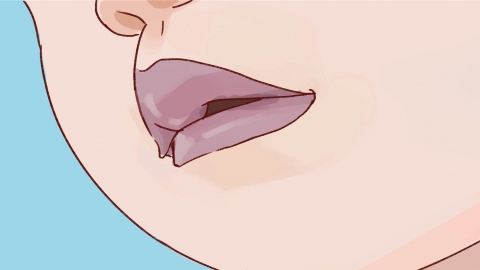Why do the lips turn purple after childbirth, and what should be done?
Generally, purple lips after childbirth may be caused by cold exposure, hypoxia, anemia, myocarditis, hypothyroidism, or other reasons. It is recommended to seek timely medical attention and follow medical advice to undergo general treatment, medication, and other therapies. Detailed explanations are as follows:

1. Cold Exposure
After childbirth, the body is relatively weak. Exposure to cold may cause blood vessels to constrict, which can hinder blood circulation, leading to purple lips and other peripheral areas due to ischemia. It is recommended to maintain a suitable indoor temperature, use air humidifiers or electric blankets, reduce body heat loss, and ensure a warm sleeping environment.
2. Hypoxia
If breathing is impaired, airways are obstructed, or there are respiratory diseases postpartum, the body may become hypoxic. In a hypoxic state, the body prioritizes delivering oxygen to vital organs to maintain their functions, potentially causing lips and other peripheral areas to appear purple due to oxygen deficiency. It is recommended to maintain good sleep habits, ensure adequate rest and sleep, and avoid excessive fatigue.
3. Anemia
Postpartum anemia can result from blood loss during delivery or insufficient nutrient intake during pregnancy, leading to reduced red blood cells and hemoglobin levels in the blood, which diminishes oxygen-carrying capacity and causes lips to appear purple due to hypoxia. Symptoms may also include pale complexion and dizziness. Treatment may include medications such as ferrous sulfate tablets, ferrous fumarate granules, and multivitamin iron oral solutions, under a doctor's guidance.
4. Myocarditis
After childbirth, the body is in a state of stress and immunity is reduced. If a viral infection occurs, myocarditis may develop. Myocardial damage can impair the heart's pumping function, leading to circulatory problems and purple lips. Symptoms may also include chest pain and palpitations. Treatment should follow medical advice and may include medications such as coenzyme Q10 capsules, furosemide tablets, and ribavirin injection.
5. Hypothyroidism
Hormonal changes during pregnancy may affect thyroid function, leading to hypothyroidism. Hypothyroidism slows down body metabolism and blood circulation, causing tissue hypoxia and purple lips. Symptoms may also include cold intolerance and fatigue. Treatment may include medications such as levothyroxine sodium tablets, thyroid tablets, and Yikang capsules, under medical guidance.
In daily life, postpartum women should ensure good ventilation in their living environment and avoid using equipment that may produce harmful gases in poorly ventilated spaces.






